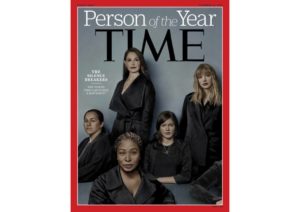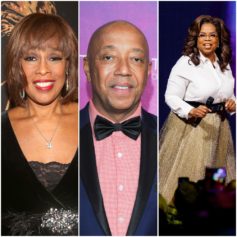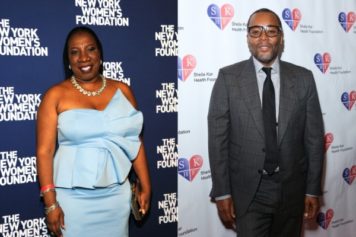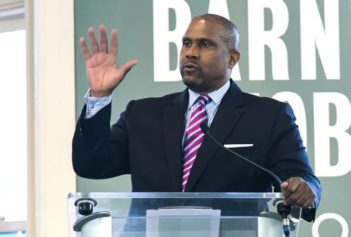
This image provided by Time magazine, shows the cover of the magazine’s Person of the Year edition as “The Silence Breakers,” those who have shared their stories about sexual assault and harassment. The magazine’s cover features Ashley Judd, Taylor Swift, Susan Fowler and others who say they have been harassed. (Time Magazine via AP)
We witnessed the #MeToo campaign become a viral sensation in recent months. All the more reason Time should have looked elsewhere in search for Person of the Year.
Congratulations to the silence breakers of the #MeToo campaign for being awarded Time magazine’s persons of the year for 2017. This, during a year that saw a slew of rape and sexual harassment allegations, expose longstanding patterns of sexual misconduct across various media, entertainment and government agencies. With more accusers steadily coming forward and the dominoes still falling, the #MeToo movement has sparked an effort to purge those industries and others like it of sexual predation. Yet I question whether or not Time has forsaken more deserving movements and the individuals that sparked them and chosen instead to engage in gender politics.
First I’d like to mention that men were overlooked entirely. Not exactly pushing for a Terry Crews Time magazine cover story here. The more obvious choice for that honor, if such an outrageous thing were ever to occur, is Corey Feldman of early ’90s “Lost Boys” fame.
By now many of us have heard the story. Feldman and his acting buddy Corey Haim were both molested by pedophiles in Hollywood dating back to the 1980s when they were barely teenagers. Haim died in 2010, supposedly of pneumonia and heart failure, but many suspect a drug overdose killed him. Either way, according to Feldman, the sexual assaults played a prominent role in the downward spiral that ended in Haim losing his life at 38 years old. Meanwhile, Feldman has worked tirelessly to expose pedophilia and sexual abuse in Hollywood, but despite the shocking details of his experience as a victim, he’s never mentioned in connection to the #Metoo movement.
This is problematic to me for a number of reasons, some of which have been cited by others in defense of the accused. Feldman did not wait 20 years and close to $20 million after the fact to report the sexual assaults against him. That would be Rose McGowan, one of the anointed faces of the #MeToo movement. It could be argued that she and others stayed silent for so long in order to achieve success in Hollywood. Corey Feldman took a far less glamorous route. He didn’t spend years strolling the red carpet, posing for paparazzi or having auspicious photos circulating in People and Entertainment Weekly. He never got to do the late night talk show circuit at the height of his short career. He doesn’t have a star on Hollywood Boulevard. After “Lost Boys” his celebrity never amounted to much more than ’90s tabloid fodder.
Yet he deserves credit for being the guy that had the guts to expose the industry while he was still a bankable star. This despite the fact that while his 1993 deposition detailing the abuses he suffered warranted the attention of local law enforcement and the Department of Justice, nobody was ever convicted, tried, arrested or even questioned in connection with the crimes. Meanwhile, the actresses that had for so long stayed quiet and only recently decided to speak out (after they were financially set) had unwittingly enabled sexual predators in the industry to operate in the shadows the entire time. People will argue that the women benefited by keeping hush as if sex for career opportunities was a trade-off worth all the trouble. With so many people claiming decades-old abuse, there is no telling how many victims might have been spared had McGowan and others spoke out when the assaults occurred rather than waiting 20 years.
I have no desire to promote gender politics. That would be detrimental to the #MeToo cause. I support everything the movement stands for. The hope is that acknowledgment of the silence breakers expands to people like Feldman, Terry Crews and anyone else that was victimized by sexual predators. My intent is to bring attention to the fact that, in searching for worthy candidates to represent the movement, Time magazine focused solely on gender victimization and less on the pervasiveness of sexual predation throughout the industry.
I know more than a few people are screaming the name Tarana Burke right now, but they can rest assured that I know who she is and am aware of her contributions. Burke is a former Philadelphian and current black activist that started the #MeToo campaign back in 2006 to bring attention to sexual abuse among women of color in marginalized communities. Strangely enough, she was omitted from Time’s cover as one of the faces, if not the face, of the movement.
Which brings me to another issue. It was easy enough for white actresses to hijack #MeToo as their own while Burke was a relative unknown in a movement she started. Those actresses aligned themselves with black women in support of causes that weren’t priorities to many in the black community, while black actresses were having their stories of victimization left out of the larger conversation.
Now ask yourself where those same white actresses were during the #OscarsSoWhite campaign. No multicultural sisterhood rushed to support that cause. Had that been the case then it might have swayed the narrative in the direction of fixing a broken Oscars voting system rather than undermining the movement with divisive rhetoric. If the #MeToo campaign has proven anything it’s the fact that people are more interested in multiracial alignment in pursuit of gender equality than they are people of all races coming together to combat racism.
Had I had a vote for Time’s POY it would have gone to a guy named Colin Kaepernick. Some of you may have heard of him. He’s the former professional quarterback that risked and eventually lost his playing career behind protesting police brutality against African-Americans. Little did Kaepernick or any of us know that he would become the face of a movement so big that it caused the NFL to pledge nearly $100 million to programs aimed at problem-solving within nonspecific African-American communities. Joining Kaepernick on my custom Time magazine cover would be some of the countless good Samaritans that stopped whatever they were doing and risked their own safety by pulling out camera phones and recording cops harassing, assaulting and in some cases, killing unarmed black men. That is a #MeToo movement I’m part of, whether I like it or not. That is a cause that speaks to part of my personal experience and historical reality.
Somewhere, between the protests and hashtag movements, is a lesson for all of us. That lesson teaches us the value of supporting causes other than those that affect us at times because, in doing so, we test the boundaries of our own moral conscience.


